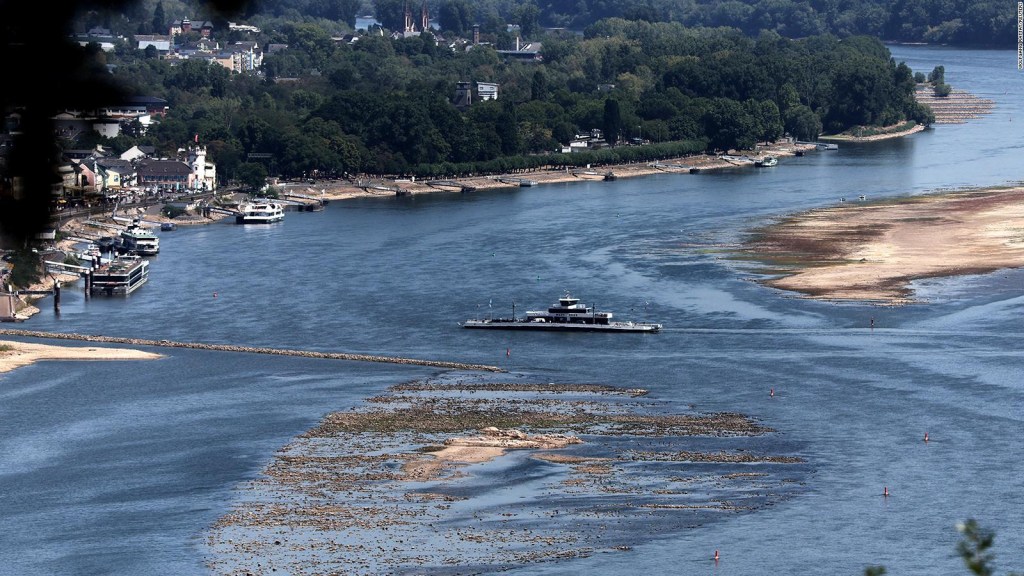Alert for fourth heat wave in Europe 4:19
Dortmund/London (CNN Business) --
Germany's Rhine River is running too dry, hampering supply chains and creating more problems for a struggling economy.
River water has dropped to "exceptionally low" levels in some areas, disrupting shipping on the country's most important waterway, German officials told CNN on Friday.
The lack of rain in recent months means that cargo ships are now carrying lighter loads, transport costs are skyrocketing and economic and electricity supply risks are worsening.
Last month, the German Federal Institute for Hydrology warned that water flows at the Kaub manometer west of Frankfurt were already only 45% of average levels for this time of year.
The agency said that had created "frequent obstructions" for ships.
Now, water levels are expected to drop further before rising "very slightly" in the coming weeks, the Rhine Waterways and Navigation Authority said on Friday.
The situation is similar to that of 2018, when similar problems with the river caused a "freight transport standstill" and reduced Germany's economic growth by an estimated 0.2%, according to economists at Deutsche Bank.
advertising
"Extreme crisis": Italian Parmesan cheese producers fear for their future amid drought
cost increase
Although water levels this year have not yet dropped to the same extent, "cargo ships already have to reduce the amount of cargo," they wrote in a report last week.
"Therefore, transportation becomes more expensive."
For example, at the Kaub measurement site, water levels below 75 centimeters often mean that a large container ship "has to reduce its load to around 30%", the economists said.
"In addition, in Germany the rate is increased to pay the load when the water level falls below a certain level," warned insurance analysts at UBS.
The drought could exacerbate an even bigger crisis for Europe's largest economy, which is already facing the risk of a recession due to the energy crisis, high inflation and supply chain disruptions.
Recently, Germany has resorted to firing up its coal plants to ensure the country maintains access to electricity while Russia restricts gas supplies.
But "much of the hard coal needed is transported from the Dutch ports of Amsterdam, Rotterdam and Antwerp by barge" along the Rhine River, adding pressure to capacity there, Deutsche Bank economists noted.
According to Henri Patricot, an oil analyst at UBS, the drop in the river's water level "is making it difficult to ship energy products, which is aggravating the supply situation for raw materials in Europe."
The Rhine is also crucial for the transport of chemicals and grain.
A ferry passes through the partially dried-up riverbed of the Rhine river in Bingen, Germany, on Aug. 9.
In a report published on Wednesday, Capital Economics said that while the Rhine problems were "a small problem for German industry compared to the gas crisis", they could become a bigger headache later this year.
If the drop in water level "persists into December, it could subtract 0.2% from GDP" in the second half of the year, "and add a touch to inflation," wrote Europe's chief economist Andrew Kenningham.
Germany declares gas crisis as Russia cuts supply to Europe
The highly important German manufacturing sector could take a bigger hit.
Researchers at the Kiel Institute for World Economy have previously found that in a month of low water levels, the country's industrial production can fall by around 1%.
Currently, the German shipping authority is not imposing restrictions on Rhine traffic due to low water.
But a spokesman for the waterways agency said in some cases commercial shipping could be unfeasible if freight had to be cut too low.
Much of Europe is experiencing extreme heat waves and droughts.
The source of London's iconic River Thames has dried up and moved some eight kilometers downstream.
The high water temperatures of the rivers in France have prevented the operation of some nuclear power plants.
And in northern Italy, farmers are facing the worst drought in 70 years, affecting the production of crops from soybeans to Parmesan.
-- Julia Horowitz contributed to this report.
GermanyDrought

